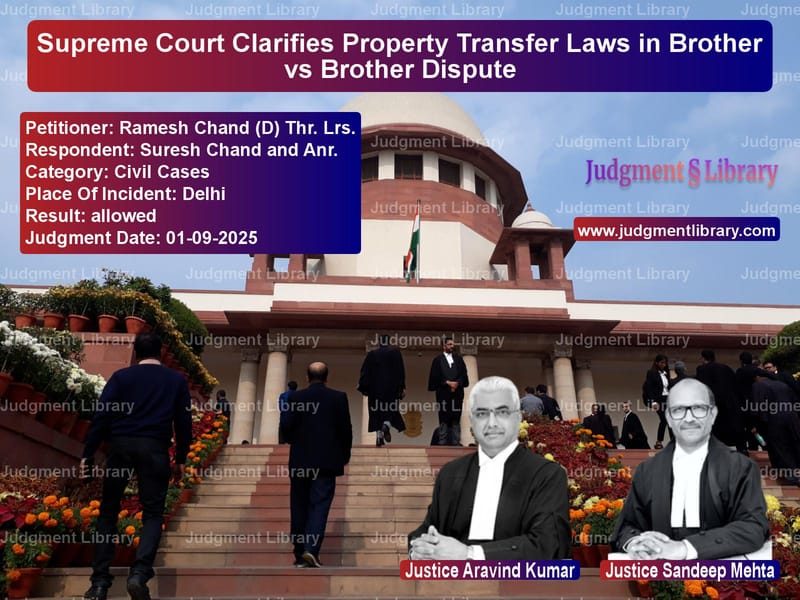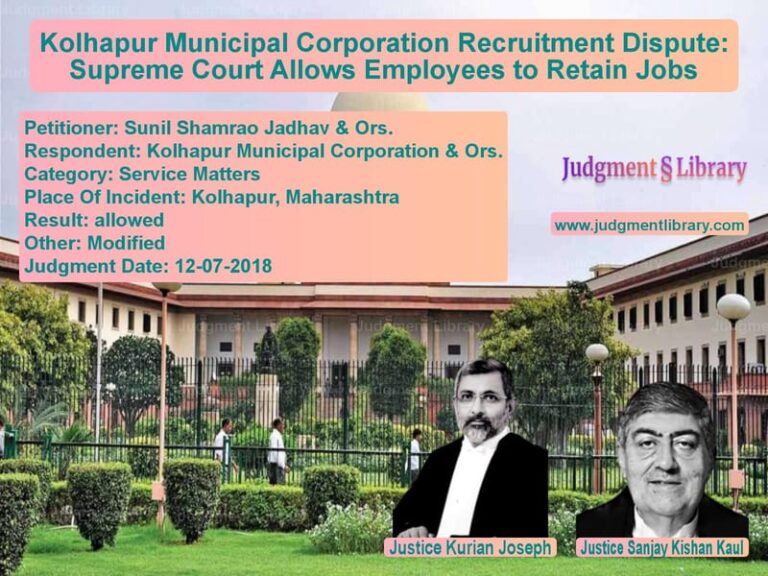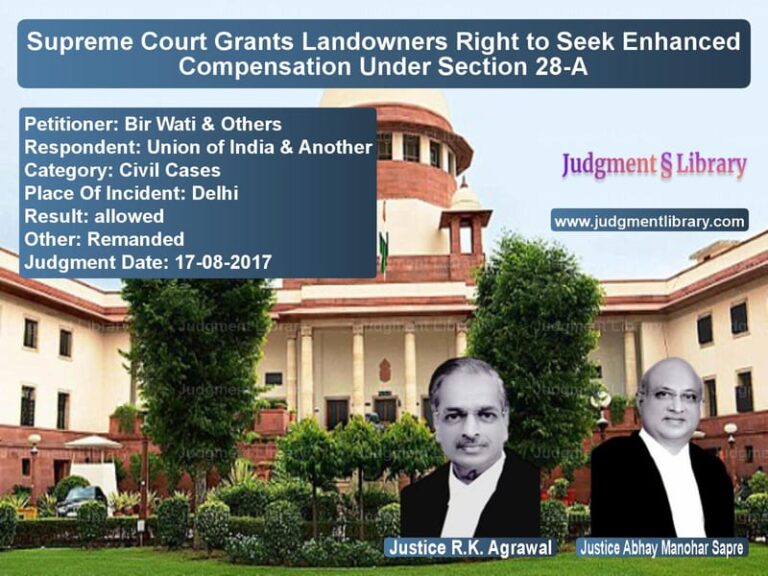Supreme Court Clarifies Property Transfer Laws in Brother vs Brother Dispute
In a significant judgment that clarifies the legal requirements for property transfers in India, the Supreme Court recently delivered a verdict that underscores the importance of proper documentation in real estate transactions. The case involved two brothers locked in a bitter dispute over their father’s property in Delhi, with the central issue revolving around whether various documents like agreement to sell, power of attorney, and will could collectively transfer ownership without a registered sale deed. The judgment provides crucial clarity on what constitutes a valid property transfer and reinforces the statutory requirements under the Transfer of Property Act.
The legal battle began over property No. 563 at Ambedkar Basti near Balmiki Gate, Delhi, originally owned by Shri Kundan Lal, father of both the appellant Ramesh Chand and respondent Suresh Chand. The case had a long history, winding through the Trial Court, High Court, and finally reaching the Supreme Court. The plaintiff, Suresh Chand, claimed he had acquired title to the suit property from his father through a General Power of Attorney, Agreement to Sell, Affidavit, Receipt, and a registered Will dated May 16, 1996. He contended that his brother Ramesh Chand was living in the property as a licensee and later as a trespasser, and had wrongfully sold half the portion to the second respondent.
Ramesh Chand, in his defense, claimed that the property had been orally transferred to him by their father in July 1973 and that he had been in continuous, uninterrupted possession since then. He filed a counterclaim seeking declaration that the documents relied upon by his brother were null and void. The Additional District Judge had decreed the suit in favor of Suresh Chand, which was initially upheld by the High Court but later remanded by the Supreme Court for fresh consideration in light of the Suraj Lamp case. The High Court again dismissed Ramesh Chand’s appeal, leading to the present civil appeal before the Supreme Court.
Before the Supreme Court, Mr. S. Mahendran, learned counsel for the appellant, made several crucial submissions. He argued that “there is no title of ownership conferred merely on the basis of Agreement to Sell, GPA, Affidavit, Receipt, Will etc. without there being any possession thereof” and that “the original title deeds of suit schedule property are in possession of the defendant No.1.” He further contended that “the Will has not been proved in accordance with law” and that “Section 53A of the Transfer of Property Act is not attracted if the possession of the property is not delivered.” He also pointed out that “the alleged Attesting Witnesses PW-3 and PW-4 could not prove the execution of the documents filed by the plaintiff such as GPA, Agreement to Sell, Receipt, Will as required by Section 3 of Transfer of Property Act, Section 68 of Indian Evidence Act and Section 63 of Indian Succession Act.”
The Supreme Court, in its detailed analysis, examined three key legal questions: whether the documents relied upon by the plaintiff conferred valid title, whether the plaintiff could claim benefit under Section 53A of the Transfer of Property Act dealing with part performance, and what relief the parties were entitled to.
On the first question regarding the agreement to sell, the Court provided a comprehensive explanation of the legal position. The Court stated that “The Transfer of immovable property inter vivos is governed by the Transfer of Property Act, 1882” and that “Section 54 of the said TP Act defines ‘sale’ and a ‘contract for sale’.” The Court emphasized that “Perusal of above said provisions lays down a specific mode of execution of sale deed with respect to immovable property for concluding the sale of a property. In sale for an immovable property the value of which exceeds Rs. 100/-, the three requirements of law are that the transfer of property of sale must take place through a validly executed sale deed, i.e., it must be in writing, properly attested and registered. Unless the sale deed is in writing, attested and registered, the transaction cannot be construed as sale, or in other words, the property will not be transferred.”
The Court further clarified the distinction between a sale deed and an agreement for sale, noting that “There is a difference between a sale deed and an agreement for sale, or a contract for sale. A contract for sale of immovable property is a contract that a sale of such property shall take place on terms settled between the parties. While a sale is a transfer of ownership; a contract for sale is merely a document creating a right to obtain another document, namely a registered sale deed to complete the transaction of sale of an immovable property.”
The Court relied on its landmark judgment in Suraj Lamp and Industries Private Limited v. State of Haryana, where it was observed that “Section 54 of the TP Act makes it clear that a contract of sale, that is, an agreement of sale does not, of itself, create any interest in or charge on such property.” The Court reiterated that “It is thus clear that a transfer of immovable property by way of sale can only be by a deed of conveyance (sale deed). In the absence of a deed of conveyance (duly stamped and registered as required by law), no right, title or interest in an immovable property can be transferred.”
Regarding the General Power of Attorney, the Court explained that “A power of attorney is a creation of an agency whereby the grantor authorizes the grantee to do the acts specified therein, on behalf of grantor, which when executed will be binding on the grantor as if done by him.” The Court emphasized that “A General Power of Attorney does not ipso facto constitute an instrument of transfer of an immovable property even where some clauses are introduced in it, holding it to be irrevocable or authorizing the attorney holder to effect sale of the immovable property on behalf of the grantor. It would not ipso facto change the character of the document transforming it into a conveyance deed.”
The Court further quoted from State of Rajasthan v. Basant Nahata, where it was held that “A grant of power of attorney is essentially governed by Chapter X of the Contract Act. By reason of a deed of power of attorney, an agent is formally appointed to act for the principal in one transaction or a series of transactions or to manage the affairs of the principal generally conferring necessary authority upon another person.”
On the question of the Will, the Court provided a detailed analysis of the legal requirements for proving a will. The Court defined a will as “the legal declaration of a testator with respect to his property which he desires to be carried into effect after his death” and noted its essential characteristics: “It must be a legal declaration of the testator’s intention; That declaration must be with respect to his property; and The desire of the testator that the said declaration should be effectuated after his death.”
The Court emphasized that “The essential quality of a testamentary disposition is ambulatoriness of revocability during the executant’s lifetime. Such a document is dependent upon the executant’s death for its vigour and effect.” The Court further explained the proof requirements, stating that “in order to rely upon a Will, the same has to be proved in accordance with law. A Will has to be attested by two witnesses, and either of the two attesting witnesses have to be examined by the propounder of the will.”
The Court found serious flaws in how the Will had been handled by the lower courts, noting that “There is not an iota of discussion about the validity of the Will as contemplated under Section 63 of the Succession Act, 1925 and Section 68 of the Evidence Act, 1872 and yet, the validity of the Will has been upheld. This is contrary to law.” The Court also identified suspicious circumstances surrounding the Will, observing that “the alleged propounder of the Will, Lt. Sh. Kundan Lal, had four children, including the plaintiff and the defendant No. 1. There is not even a whisper of reasoning as to why the propounder of the Will choose to exclude other three children from the bequest, and whether any other properties or assets were given to them. It is highly unlikely that a father would grant his entire property to one of his children, at the cost of three others, without there being any evidence of estrangement between the father and the children.”
Regarding the claim under Section 53A of the Transfer of Property Act (doctrine of part performance), the Court explained that “where there is a contract to transfer any immovable property in writing and the transferee has in part performance of the contract taken the possession of the property or part thereof, then notwithstanding that the transfer has not been completed in the manner prescribed by law, the transferor will be debarred from taking the possession of the property.” However, the Court noted that “one of the main ingredients for taking shelter under Section 53A is the factum of possession. Unless the transferee in the instrument of agreement to sale is able to prove that he has been in possession of the suit property, no benefit u/s 53A will be given.” Since the plaintiff had filed the suit for possession, it indicated he wasn’t in possession and therefore couldn’t claim benefit under this section.
In its conclusion, the Supreme Court set aside the impugned judgment and allowed the appeal, dismissing the plaintiff’s suit. The Court held that since the Will wasn’t proved and no valid transfer had occurred through the other documents, the property would devolve upon all class-I legal heirs of Shri Kundan Lal. The Court also protected the rights of the second respondent, who had purchased 50% share from the appellant, to the extent of the appellant’s share only.
This judgment serves as an important reminder about the strict requirements for property transfers in India and reinforces the principle that documents like agreement to sell, power of attorney, and will cannot substitute for a properly executed and registered sale deed when it comes to transferring ownership of immovable property. The decision provides much-needed clarity for property transactions and emphasizes the importance of following proper legal procedures to avoid future disputes.
Petitioner Name: Ramesh Chand (D) Thr. Lrs..Respondent Name: Suresh Chand and Anr..Judgment By: Justice Aravind Kumar, Justice Sandeep Mehta.Place Of Incident: Delhi.Judgment Date: 01-09-2025.Result: allowed.
Don’t miss out on the full details! Download the complete judgment in PDF format below and gain valuable insights instantly!
Download Judgment: ramesh-chand-(d)-thr-vs-suresh-chand-and-anr-supreme-court-of-india-judgment-dated-01-09-2025.pdf
Directly Download Judgment: Directly download this Judgment
See all petitions in Property Disputes
See all petitions in Contract Disputes
See all petitions in Succession and Wills
See all petitions in Specific Performance
See all petitions in Damages and Compensation
See all petitions in Judgment by Aravind Kumar
See all petitions in Judgment by Sandeep Mehta
See all petitions in allowed
See all petitions in supreme court of India judgments September 2025
See all petitions in 2025 judgments
See all posts in Civil Cases Category
See all allowed petitions in Civil Cases Category
See all Dismissed petitions in Civil Cases Category
See all partially allowed petitions in Civil Cases Category







